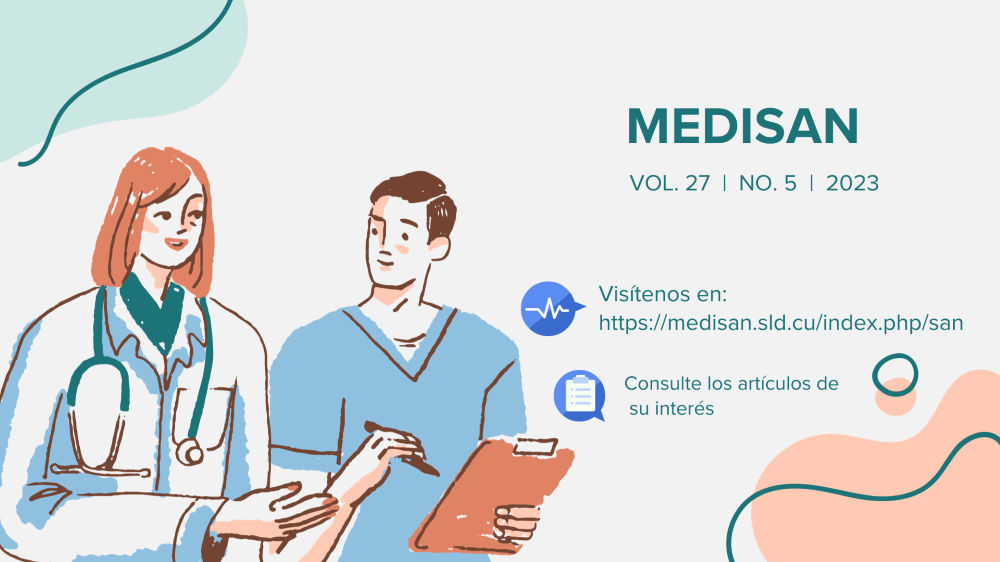Tendencies in pedagogic and scientific-investigative professional training in nurses and health technologists
Keywords:
teaching staff, pedagogic tendencies, scientific-investigative activity, pedagogic preparation.Abstract
Introduction: The increase in scientific knowledge and its technological implementations has an effect on a group of spheres of life, particularly education.
Objective: To analyze the main tendencies of the pedagogic and scientific - investigative training in nursing and health technology professionals.
Methods: An educational, descriptive, longitudinal and prospective study was carried out that included 45 professors from the Health Nursing-Technology Faculty of Santiago de Cuba, linked to the teaching educational process from September, 2021 to July, 2022, for which theoretical and practical methods were used.
Results: In the series, there was a prevalence of the professors trained in the health sector (93.3%) in connection with those graduated from the Ministry of Higher Education (6.7%). All of them had received pedagogic and scientific-investigative training, but they considered that their pedagogical arsenal was still insufficient.
Conclusions: The integration of teaching with attendance and research was the most evident tendency in members of the case material.
Downloads
References
2. Albán C, Acosta M, Sellan V, Escobar A. Procedimiento para la formación profesional de los internos de Enfermería. Revista Formación y Calidad Educativa. 2021;9(1):241-56.
3. Achilli EL. Investigación y formación docente. Interrogantes sobre la educación pública. 2013 [citado 24/11/2022]. Disponible en: https://www.fceia.unr.edu.ar/geii/maestria/2013/2013_extrasYmetodologia/cuasiPalermo/Achilli_investigacion%20y%20formacion%20docente,%20interrogantes%20sobre%20la%20educacion%20publica.pdf
4. Trujillo Flórez LM. Tendencias Pedagógicas Contemporáneas. Bogotá D.C.: Fundación Universitaria del Área Andina; 2017 [citado 24/11/2022]. Disponible en: https://digitk.areandina.edu.co/bitstream/handle/areandina/825/Teor%c3%adas%20pedag%c3%b3gicas%20contempor%c3%a1neas.pdf?sequence=1&isAllowed=y
5. Mur Villar N, Iglesias León M, Aguilar Cordero MJ, Quintana Santiago YM, Cortés Cortés M. La formación docente de los profesionales de las Ciencias de la Salud como recurso para la integración docente asistencial e investigativa. Medisur. 2010 [citado 24/11/2022];8(6). Disponible en: https://medisur.sld.cu/index.php/medisur/article/view/1423/6173#
6. Alonso Betancourt LA, Cruz Cabezas MA, Ronquillo Triviño LE. Enseñanza aprendizaje profesional para formar trabajadores competentes. Manta: Libro Mundo; 2022.
7. Corral Joniaux JA, Moya Joniaux CA, Alonso Betancourt LA. Propuesta de la competencia de innovación de procesos educativos: una vía para la formación de profesionales creativos y emprendedores. Luz. 2020 [citado 24/11/2022];19(3):19-32. Disponible en: https://www.redalyc.org/journal/5891/589165783002/html/
8. Alonso Betancourt LA, Larrea Plúa JJ, Moya Joniaux CA. Metodología para la formación de competencias profesionales en estudiantes universitarios mediante proyectos formativos. Transformación. 2020 [citado 24/11/2022];16(3). Disponible en: http://scielo.sld.cu/scielo.php?script=sci_arttext&pid=S2077-29552020000300544
9. Díaz Rodríguez M, Alcántara Rubio L, Aguilar García D, Puertas Cristóbal E, Cano Valera M. Orientaciones formativas para un cuidado humanizado en enfermería: una revisión integrativa de la literatura. Enferm Glob. 2020 [citado 24/11/2022];19(58). Disponible en: https://scielo.isciii.es/scielo.php?script=sci_arttext&pid=S1695-61412020000200020
10. Machado Ramírez EF, Montes de Oca Recio N. Competencias, currículo y aprendizaje en la universidad. Motivos para un debate: Antecedentes y discusiones conceptuales. Transformación. 2020;16(1):1-12.
11. Gamboa Graus ME, Castillo Rojas Y, Parra Rodríguez JF. Caracterización de la competencia de dirección en educación para el ejercicio pedagógico en el escenario educativo tunero. Dilemas Contemporáneos: Educación, Política y Valores. 2019 [citado 24/11/2022];6(3). Disponible en: https://www.dilemascontemporaneoseducacionpoliticayvalores.com/index.php/dilemas/article/view/1811/1930
12. Tejada S, Ramírez EJ, Díaz RJ, Huyhua SC. Práctica pedagógica en la formación para el cuidado de enfermería. Enfermería Univ. 2019 [citado 18/07/2019];16(1). Disponible en: https://www.scielo.org.mx/pdf/eu/v16n1/2395-8421-eu-16-01-41.pdf
13. La Madriz González JJ, Mendoza Velazco DJ. Representación social que le confieren los estudiantes de la UNIB.E al método de Aula Invertida. Espacios. 2018;39(52):37-58.
14. Gamboa ME, Castillo Y, Parra JF. Procedimiento para el desarrollo de la gestión de información como competencia de dirección en educación. Didáctica y Educación. 2021;12(2):71-95.
15. Reynosa Navarro E, Serrano Polo EA, Ortega Parra AJ, Navarro Silva O, Cruz Montero JM, Salazar Montoya EO. Estrategias didácticas para investigación científica: relevancia en la formación de investigadores. Universidad y Sociedad. 2020 [citado 24/11/2022];12(1):259-66. Disponible en: http://scielo.sld.cu/scielo.php?script=sci_arttext&pid=S2218-36202020000100259
Published
How to Cite
Issue
Section
License
All the articles can be downloaded or read for free. The journal does not charge any amount of money to the authors for the reception, edition or the publication of the articles, making the whole process completely free. Medisan has no embargo period and it is published under the license of Creative Commons, International Non Commercial Recognition 4.0, which authorizes the copy, reproduction and the total or partial distribution of the articles in any format or platform, with the conditions of citing the source of information and not to be used for profitable purposes.





